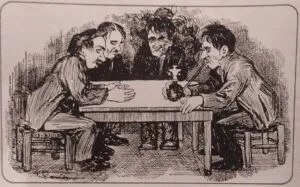Research Cooperation with the Oriental Institute of the Czech Academy of Sciences
On May 4, 2022, Dr. Táňa Dluhošová, the director of the Oriental Institute of the Czech Academy of Sciences (Orientální ústav AV ČR), and the acting director of the Orient-Institut Istanbul of the Max Weber Foundation, Dr. Richard Wittmann, signed a formal declaration of intent to establish a comprehensive research cooperation between their research institutions based in Prague and Istanbul. The Oriental Institute of the Czech Academy of Sciences is celebrating its hundredth anniversary this year. Since 1993, part of the Czech Academy of Sciences (CAS), the institute currently employs a number of outstanding Czech and international researchers with regional expertise on the Middle East from antiquity to the present, the Arab world, China, India, Israel, Iran, Japan, Southeast Asia, the Ottoman Empire, and the Republic of Turkey. For the researchers of the Orient Institute and our partners in Turkey, this collaboration opens up excellent new opportunities for academic exchange concerning the research topics existing at the institute as well as for comparative research on other regions, facilitated by the broad spectrum of regional expertise of the Prague partner institution.
2022/2023
Dr. Stefano Taglia, Oriental Institute, Academy of Sciences of the Czech Republic, Prague
Cannabis, Cannabis Addicts, and the State of the Late Ottoman Empire

My research project deals with an extraordinary but often overlooked phenomenon of Turkish classical music, which went hand in hand with the founding of the Republic of Turkey by Mustafa Kemal Atatürk in 1923: the emergence of numerous new types of choirs throughout the Republic, partly in state service, partly in amateur hands, which also brought about a fundamental change in musical genres and performance practices. The central thesis in Wozniak’s research project is that seemingly extra-musical social and political events during the decline of the Ottoman Empire and the emergence of the Republic of Turkey found their expression in the newly emerging choirs of Turkish classical music. As a result, these choirs can be regarded as valuable socio-cultural microcosms in which anxieties and conflicts about (personal and national) identity are played out in rehearsal and performance practice. Using ethnographic and archive-based methods, the research project traces both the historical phenomenon of the choir as an ensemble constellation in Turkish classical music over the past century and its manifold current embodiments in urban contexts in Turkey and the diaspora. My project is the first to examine choirs of Turkish classical music as venues where debates about “Turkishness” and concerns about political, cultural, and social values are still acted out. The aim of the work is for the documentation of the cultural and political significance of choirs of Turkish classical music to achieve a lasting national and international impact by demonstrating how a particular embodiment of Turkish cultural heritage could gain importance for the citizens of Turkey and Turks around the world.